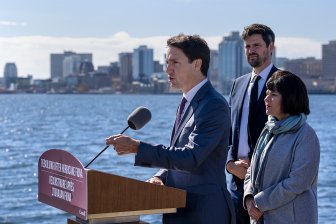The New Brunswick government says due to a strong real estate market and new construction, property assessments are going up.
Out of 447,000 assessments, the total value is $81 billion. It’s an increase of 10.9 per cent, or $8 billion since last year.
However, the large increase in property assessment and the suggestion by Service New Brunswick Minister Mary Wilson that “local governments will need to take these assessment increases into consideration when setting their property tax rates for next year” is drawing some criticism.
“We just don’t understand how the province is arriving at these assessments, number one,” said former Saint John mayor Don Darling.
“Number two, there is no understanding why some organizations or industry or taxpayers seem to get break after tax break after tax break.”
Read more:
COVID-19: New Brunswick reports 5 deaths, steady hospitalizations
Read More
-
COVID-19: New Brunswick reports 5 deaths, steady hospitalizations
Darling was critical in helping the city repair its financial status and building a plan toward improving it over the next several years alongside city staff.
He was also a big part in advocating for industry, which is a large part of the landscape in Saint John, to pay its fair share in taxes.
The Progressive Conservatives made promises to Darling and the city that the party would undertake comprehensive tax reform, but he said that has truly happened.
“We’re given lip service. We get a meeting once and awhile. You might get lucky to get an email returned,” he said.
“So to have this band-aid approach to tax reform with no meaningful engagement — you know, to have assessments come out with more questions than we have answers — and be lectured from Fredericton that we must automatically lower our tax rates is not a partnership.”
Read more:
Seats for physicians move back to New Brunswick medical school
Saint John councillor David Hickey said the ultimate goal is to reduce the tax rate, but it involves heavy industry paying a fair share.
Following the rollout of the assessments, Hickey took to Facebook to say that the Saint John Regional Hospital has a higher tax increase than 13 different industry-based companies combined.
Hickey listed them, which included several Irving-owned businesses, LNG and the Port of Saint John, among others.
“We can’t constantly bear the assessment needs or the tax return on our residential players,” he said. “We need to see that draw from our industrial players, too. Take for example the Irving Oil Refinery. At that oil refinery, currently the neighbouring community of Champlain Heights is higher contributor to Saint John tax base than the largest oil refinery in Canada.”
In fact, the province reports the majority of market activity is in the residential sector. The residential sector accounts for $7.11 billion, or 11.9 per cent, while non-residential contributes just $880 million, or 6.2 per cent.
“All properties, regardless of their classification, are assessed the same,” according to a statement from Service New Brunswick. “Assessors do not determine the market value; they reflect the values that have been established by buyers and sellers in local real estate markets across the province.
“Market value is the price that the property would likely sell for on the open real estate market on January 1 of each year. It is the most common method used in North America today.”
It did note in the statement several things it had done in terms of tax reform in the province, including:
- Provincial property tax rates have been reduced.
- Beginning in 2023, local governments have additional flexibility in setting the local rates for non-residential properties (set 1.4 to 1.7 times the residential rate as opposed to the current fixed rate of 1.5 times the residential rate) and the new classification for heavy industrial properties (set 1.4 to 1.7 times the residential rate)
- Property tax relief for eligible apartments and non-residential properties with assessment increases exceeding 10 per cent (with the province responsible for both the provincial and local property tax impacts).
In Moncton, the city expects property assessments to increase generally by 14 per cent — something the city hasn’t seen before.
Read more:
N.B. child and youth advocate says province lacks long-term vision for mental health care
Last year, the city saw it rise by 10 per cent, so the city did reduce the tax rate by 10 cents. Jacques Doucet, the city’s chief financial officer, said there are several things that need to be considered before they can reduce the tax rate.
“As a municipality also we have to consider that we are dealing with inflationary issues,” he said. “We are dealing with certain corporate pressures that we need to address. So we are not always able to offset it completely.”
Doucet said the city continues to wait on the firm figures, but said reducing the tax rate is a fine line.
He said the pressure is on the municipalities to find the sweet spot between maintaining affordability and maintaining good services and infrastructure.
“We do not control assessment in this province, but we can always offset the increase in assessment by lowering the tax rate,” he said. “It is one we will look at. We always have to consider affordability to our taxpayers.”

© 2022 Global News, a division of Corus Entertainment Inc.




